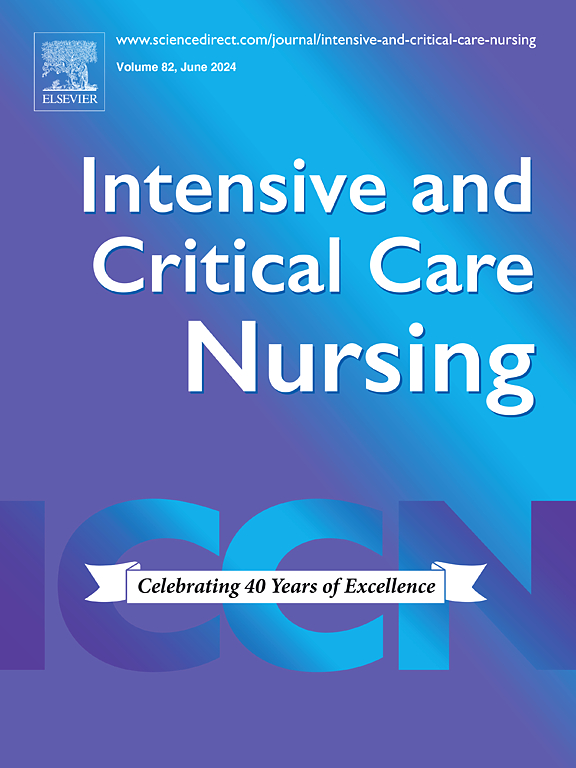DELIMA教育计划对儿科重症监护病房护士谵妄诊断知识、信心、态度及准确性的影响。
IF 4.9
2区 医学
Q1 NURSING
引用次数: 0
摘要
目的:评价基于知识-行动框架的4周谵妄介绍和维持方案对儿科重症监护病房(PICU)护士谵妄知识、自信、态度和筛查准确性的影响。研究方法/设计:采用前测后测设计的准实验研究。环境:本研究于2024年1月至2月在两个印度尼西亚picu的护士中进行。主要观察指标:在基线及干预实施后第3、4周(维持期)测量护理知识、自信和态度。采用康奈尔儿童谵妄评估(CAPD)评估干预后第3周和第4周谵妄筛查的准确性。结果:共有44名护士参与干预,平均年龄28岁。干预后第3周和第4周,干预组在知识(B = 1.35和1.39)、自信和态度(B = 1.26和1.29)、筛查准确率(B = 0.25和0.27)方面均较对照组有显著改善(均P < 0.05)。干预组护士使用CAPD对谵妄的筛查准确率从50%(第1周)提高到86%(第3周)和100%(第4周),而对照组护士对谵妄的筛查准确率从17%适度提高到33%(第3周)和37%(第4周)。结论:理论驱动的多模式干预提高了护士对谵妄的认识、自信和态度,提高了谵妄的筛查准确率。实施全面的谵妄教育计划可以提高重症监护病房谵妄的识别和管理。未来的研究应该调查谵妄教育项目对患者预后的长期影响。对临床实践的启示:采用综合教学方法提高护士对谵妄的知识、自信、态度和筛查准确性。本文章由计算机程序翻译,如有差异,请以英文原文为准。
Effects of DELIMA education programme on nurses’ knowledge, confidence, attitude, and screening accuracy for delirium in paediatric intensive care units
Objective
To evaluate the effects of a 4-week Delirium Introduction and Maintenance programme based on the knowledge-to-action framework on nurses’ knowledge, self-confidence, attitudes, and screening accuracy for delirium in the paediatric intensive care unit (PICU).
Research Methodology/design
A quasi-experimental study with a pretest–posttest design.
Setting
This study was conducted between January and February 2024 with nurses in two Indonesian PICUs.
Main outcome measures
Nursing knowledge, self-confidence and attitudes were measured at baseline and the third and fourth weeks (maintenance period) after the intervention was implemented. The Cornell Assessment of Pediatric Delirium (CAPD) was used to evaluate the screening accuracy for delirium at the third and fourth weeks postintervention.
Results
A total of 44 nurses with a mean age of 28 years participated in the intervention. At weeks 3 and 4 after the intervention, the intervention group exhibited substantial improvements in knowledge (B = 1.35 and 1.39), self-confidence and attitudes (B = 1.26 and 1.29), and screening accuracy (B = 0.25 and 0.27) compared with the control group (all P < 0.05). The nurses’ screening accuracy for delirium by using the CAPD improved from 50 % (week 1) to 86 % (week 3) and 100 % (week 4) in the intervention group, whereas the nurses’ screening accuracy for delirium in the control group modestly increased from 17 % to 33 % (week 3) and 37 % (week 4).
Conclusions
The theory-driven, multimodal intervention improved the nurses’ knowledge of delirium, self-confidence and attitudes, and screening accuracy for delirium. Implementing comprehensive delirium education programmes can enhance delirium recognition and management in PICUs. Future studies should investigate the long-term effects of delirium education programmes on patient outcomes.
Implications for clinical practice
An integrated instructional approach was employed to improve nurses’ knowledge, self-confidence, attitudes, and screening accuracy for delirium.
求助全文
通过发布文献求助,成功后即可免费获取论文全文。
去求助
来源期刊

Intensive and Critical Care Nursing
NURSING-
CiteScore
6.30
自引率
15.10%
发文量
144
审稿时长
57 days
期刊介绍:
The aims of Intensive and Critical Care Nursing are to promote excellence of care of critically ill patients by specialist nurses and their professional colleagues; to provide an international and interdisciplinary forum for the publication, dissemination and exchange of research findings, experience and ideas; to develop and enhance the knowledge, skills, attitudes and creative thinking essential to good critical care nursing practice. The journal publishes reviews, updates and feature articles in addition to original papers and significant preliminary communications. Articles may deal with any part of practice including relevant clinical, research, educational, psychological and technological aspects.
 求助内容:
求助内容: 应助结果提醒方式:
应助结果提醒方式:


